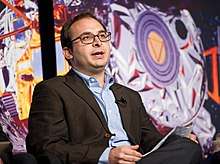Kevin Schawinski
Kevin Schawinski (April 28, 1981 in Zürich) is a Swiss astrophysicist. He was a professor at ETH Zurich (the Swiss Federal Institute of Technology) in Zürich.[2]
Kevin Schawinski | |
|---|---|
 | |
| Born | 28 April 1981[1] |
| Citizenship | Swiss and German |
| Alma mater | Cornell University Oxford University |
| Known for | Galaxy Zoo |
| Awards | RAS Michael Penston Prize, EAS MERAC Prize |
| Scientific career | |
| Institutions | University of Oxford Yale University ETH Zürich |
| Doctoral advisor | Sukyoung Yi |
| Website | Research group homepage |
Early life
Kevin Schawinski grew up in both Switzerland and Germany. His father is Swiss media entrepreneur Roger Schawinski.
Education
Kevin Schawinski graduated from Cornell University in the United States in 2004 with degrees in both physics and mathematics. Following that, he went to the University of Oxford, where he was a fellow at Christ Church College and later the "Henry Skynner Junior Research Fellow" at Balliol College. He was awarded the Royal Astronomical Society's 2008 Michael Penston Prize for his doctoral thesis "The Star Formation History of Early-type Galaxies".[3][4] He received his D.Phil. in 2008.
While a graduate student at Oxford, Schawinski founded the citizen science project Galaxy Zoo along with researcher Chris Lintott,[5] which later became the Zooniverse.
Career
From 2008 to 2012, Schawinski was a postdoctoral research associate at Yale University and in 2009 became a NASA Einstein Fellow.[6] His research at Yale included studies of black holes, galaxy formation, and co-founding the citizen science project Planet Hunters.[7]
In 2012, he became a professor in the Institute for Astronomy at ETH Zürich in Switzerland.[2][8] He is the secretary of the Swiss Society of Astrophysics and Astronomy, the professional society of astronomers in Switzerland.[9] The Gottlieb Duttweiler Institute named him one of the "Thought Leaders" of Switzerland in 2016.[10] In 2017, he was awarded the European Astronomical Society's MERAC Prize as the best junior researcher in observational astrophysics.[11][12] In 2017, he launched the Space.ml platform with Ce Zhang to apply artificial intelligence to astrophysics research.[13][14][15]
Together with colleagues from ETH Zurich and the University of Zurich, he founded the Citizen Science Center Zurich.[16]
Research
Schawinski has worked on a range of topics from galaxy evolution, black hole astrophysics, citizen science and artificial intelligence.[17] He has published over 200 peer reviewed articles, including 6 in Nature and Science. His publications have been cited over 16,000 times.[18][19]
See also
- Zooniverse
- Hanny's Voorwerp
- Pea galaxy
- Reinventing Discovery
References
- Roy Spring. "Eine Odyssee im Zeitraffer". Archived from the original on 8 April 2008. Retrieved 13 October 2014.
- "Prof. K. Schawinski". ETH. 27 September 2012. Archived from the original on 22 November 2014. Retrieved 13 October 2014.
- "Schawinski Thesis". University of Oxford. 2007. Retrieved 13 October 2014.
- "Royal Astronomical Society thesis prize winners" (PDF). RAS. Retrieved 13 October 2014.
- Bob Tedeschi (3 April 2009). "Looking to the Night Sky and Then a Web Site". The New York Times. Retrieved 13 October 2014.
- "List of Einstein Fellows, CXC/NASA". The Chandra X-Ray Center. 2009. Retrieved 13 October 2014.
- "Citizen Scientists Join Search for Earth-like Planets". Yale University. 16 December 2010. Retrieved 13 October 2014.
- Matthias Meili (16 March 2013). "Ein kometenhafter Aufstieg". Tages Anzeiger. Retrieved 13 October 2014.
- "SSAA executive committee". Retrieved 16 October 2015.
- "Toplist Swiss 2016 - Thought Leaders". Thought Leaders. Retrieved 31 August 2017.
- "Merac Prizes". European Astronomical Society. Retrieved 28 January 2018.
- "2017 MERAC Prize to Kevin Schawinski".
- "From Model-driven Astrophysics to Data-driven Astrophysicsl". ETH. Retrieved 28 January 2018.
- Adrienne LaFrance (2 March 2017). "Machine Learning Is Bringing the Cosmos Into Focus". The Atlantic. Retrieved 28 January 2018.
- Sarah Scoles (3 June 2017). "Astronomers Deploy AI to Unravel the Mysteries of the Universe". Wired. Retrieved 28 January 2018.
- "Citizen Science Center - Zurich". citizenscience.ch. Retrieved 2018-03-14.
- Science Journal Staff (5 July 2017). "AI is changing how we do science. Get a glimpse". American Association for the Advancement of Science. Retrieved 28 January 2018.
- "NASA ADS System". Smithsonian Astrophysical Observatory. Retrieved 28 January 2018.
- "Kevin Schawinski on Google Scholar". Google Scholar. Retrieved 14 August 2019.
External links
- CBC Radio Interview An interview of K. Schawinski on CBC radio.